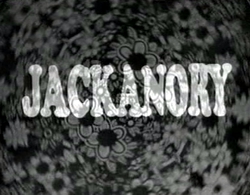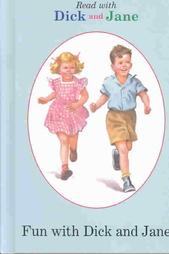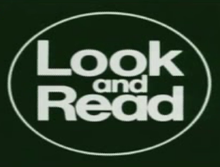I'm Sorry, I'll Read That Again was a BBC radio comedy programme that was developed from the 1964 Cambridge University Footlights revue, Cambridge Circus., as a scripted sketch show. It had a devoted youth following, with the live tapings enjoying very lively audiences, particularly when familiar themes and characters were repeated; a tradition that continued into the spinoff show I'm Sorry I Haven't a Clue.

Grange Hill is a British children's television drama series, originally produced by the BBC and portraying life in a typical comprehensive school. The show began its run on 8 February 1978 on BBC1, and was one of the longest-running programmes on British television when it ended on 15 September 2008 after 31 series. It was created by Phil Redmond, who is also responsible for the Channel 4 dramas Brookside and Hollyoaks; other notable production team members down the years have included producer Colin Cant and script editor Anthony Minghella.

Jackanory is a BBC children's television series which was originally broadcast between 1965 and 1996. It was designed to stimulate an interest in reading. The show was first transmitted on 13 December 1965, and the first story was the fairy-tale "Cap-o'-Rushes" read by Lee Montague. Jackanory was broadcast until 1996, with around 3,500 episodes in its 30-year run.
The Mary Whitehouse Experience is a British topical sketch comedy show that the BBC produced in association with Spitting Image Productions. It starred two comedy double acts, one being David Baddiel and Rob Newman, the other Steve Punt and Hugh Dennis. All four comedians had graduated from Cambridge University. It was broadcast on both radio and television in the late 1980s and early 1990s.

Dark Season is a British science-fiction television serial for adolescents, screened on BBC1 in late 1991.

Balamory is a Scottish live-action children's programme on CBeebies for pre-school children, about a fictional small island community off the west coast of Scotland, named Balamory. Four series were produced from 2002 to 2005 by BBC Scotland, with 253 episodes made. The programme was created by Brian Jameson.

Marco Polo is the fourth serial of the British science fiction television series Doctor Who. It was first broadcast on BBC TV in seven weekly parts from 22 February to 4 April 1964. It was written by John Lucarotti and directed largely by Waris Hussein; John Crockett directed the fourth episode. The story is set in Yuan-era China in the year 1289, where the Doctor, his granddaughter Susan Foreman, and her teachers Ian Chesterton and Barbara Wright meet the Italian merchant-explorer Marco Polo and Mongolian Emperor Kublai Khan.

Dick and Jane are the two main characters created by Zerna Sharp for a series of basal readers written by William S. Gray to teach children to read. The characters first appeared in the Elson-Gray Readers in 1930 and continued in a subsequent series of books through the final version in 1965. These readers were used in classrooms in the United States and in other English-speaking countries for nearly four decades, reaching the height of their popularity in the 1950s, when 80 percent of first-grade students in the United States used them. Although the Dick and Jane series of primers continued to be sold until 1973 and remained in use in some classrooms throughout the 1970s, they were replaced with other reading texts by the 1980s and gradually disappeared from school curricula.

Z-Cars or Z Cars was a British television police procedural series centred on the work of mobile uniformed police in the fictional town of Newtown, based on Kirkby, near Liverpool. Produced by the BBC, it debuted in January 1962 and ran until September 1978.

The Quatermass Memoirs is a British radio drama-documentary, originally broadcast in 5 episodes on BBC Radio 3 in March 1996. Written by Nigel Kneale, it was born out of his Quatermass series of films and television serials, which had first been broadcast in the 1950s. The idea for the show appeared as BBC radio intended to create a season of programming looking back at the 1950s, and it was the final piece of writing Kneale completed relating to the character.
Listen with Mother was a BBC radio programme for children which ran between 16 January 1950 to 10 September 1982. It was originally produced by Freda Lingstrom although for the majority of its run it was produced by George Dixon, and was presented over the years by Daphne Oxenford, Julia Lang, Eileen Browne, Dorothy Smith and others.

Lizzie Dripping is a British television children's programme produced by the BBC in 1973 and 1974. It was written by Helen Cresswell and set in the country village of Little Hemlock, where a young girl, Penelope, with a vivid imagination encounters a local witch whom only she can see and hear. This ability is further complicated by Penelope having a reputation for being an imaginative liar, making it even more difficult for her to convince others that her witch is real.
Roger James Limb is a British composer, specialising in electronic music. He is best known for his work on the television series Doctor Who whilst at the BBC Radiophonic Workshop. He joined the BBC as a studio manager, before going on to become a television announcer. In 1972 he left this position to join the Radiophonic Workshop, where he remained until 1995. Although he had received formal music training, he also spent much time in pop and jazz bands, the influence of which can be heard in much of his music.

Earth Warp is a story produced by the BBC as part of their Look and Read programme. It originally aired on BBC2 from 11 January to 22 March 1994. The story was 10 episodes long and focused heavily on pollution. It has been repeated many times since the original broadcast, as recently as 2009.
Dan and Nick: The Wildebeest Years was a BBC Radio 4 comedy series originally broadcast in seven episodes in 1998. The Dan and Nick of the title are Dan Freedman and Nick Romero, who often appeared together on Loose Ends.
BBC Schools, also known as BBC for Schools and Colleges or BBC Education, is the educational programming strand set up by the BBC in 1957, broadcasting a range of educational programmes for children aged 5–16. From launch until June 1983, programming was based on BBC1 during the daytime, apart from coverage of major news events which saw the programmes shifted to BBC2. In September 1983, programming was transferred permanently to BBC2 freeing BBC1 to develop its own daytime schedule. The strand, named Daytime on Two, remained on BBC Two until March 2010, later supplemented by the 'Class TV' strand on CBBC.
Sherlock Holmes or Puppet Entertainment Sherlock Holmes is a Japanese puppetry television series written by Kōki Mitani and produced and broadcast by NHK. The puppets for the series were designed by Bunta Inoue. The first series of 18 episodes was broadcast on Sundays from 12 October 2014 to 15 February 2015 by NHK Educational TV (ETV); the first six episodes were broadcast by NHK General TV (GTV) in March and August 2014. A special programme was broadcast on 5 October 2014 while a "Sherlock Holmes Award" was broadcast on 28 December 2014. Each episode was rebroadcast on successive Fridays. The programme won the Japan Sherlock Holmes Award on 22 March 2015.
Rawlinson End was a series of thirteen 15-20 minute radio broadcasts, created and performed by Vivian Stanshall for BBC Radio 1 between 1975 and 1991. The early sessions formed the template for Stanshall's 1978 album Sir Henry at Rawlinson End, as well as the 1980 film of the same name. Material from the three final episodes, recorded between 1988 and 1991, together with previously-unreleased linking narration and music recorded by Stanshall in the 1990s, were compiled posthumously as the 2023 album Rawlinson's End.
Cloud Burst is a ten-part story within the Look and Read series of BBC Television programme for primary schools, aimed at improving children's literacy skills. The first episode of Cloud Burst was first broadcast on 24 September 1974; the last episodes was first broadcast on 3 December 1974.
Badger Girl was a ten-part educational BBC Look and Read production, which was first aired on BBC2 in 1984.










